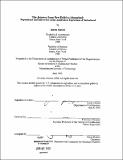| dc.contributor.advisor | Francesco Passanti. | en_US |
| dc.contributor.author | Ahmed, Imran | en_US |
| dc.date.accessioned | 2005-08-15T16:46:12Z | |
| dc.date.available | 2005-08-15T16:46:12Z | |
| dc.date.copyright | 1992 | en_US |
| dc.date.issued | 1992 | en_US |
| dc.identifier.uri | http://hdl.handle.net/1721.1/13185 | |
| dc.description | Thesis (M.S.)--Massachusetts Institute of Technology, Dept. of Architecture, 1992. | en_US |
| dc.description | Includes bibliographical references (leaves 160-173). | en_US |
| dc.description.abstract | This thesis addresses the critical terrain on which the colonial and post-colonial narratives of identity take shape. Taking Gayatri Spivak's aphorism that imperialism requires a rereading "not because Empire ..... is abstract, but because Empire messes with identity" as its premise, it attempts to map the spatio-temporal territory of identity expression inscribed between colonial New Delhi - "The King's God Child" - as the capital city of Imperial British India, and post-colonial Islamabad - "The City of Islam" - as the capital city of the nation-state the Islamic Republic of Pakistan. The paper identifies a colonial legacy in Islamabad, and establishes the dialogic persistence of socio-spatial structures congruent in both cities. The independent nation status attained by much of the developing world in the last fifty years can be taken as a change in consciousness: breaking with the past is inextricably linked with the sense that tradition has been dismembered. This has led to a crystallization of memory at the particular moment of independence, and an effort to embody memory within a sense of historical continuity. Effacement of identity, which was once the only means of survival for the colonized, has been replaced by the legitimation of identity. The return to a denied heritage requires a re-invention of traditions which project an apparent coherence. Public architecture, as a form of cultural production, allows the suppression of inherent contradictions within the constitution of a nation. In this capacity it functions in much the same way as ideology. Capital cities as signifiers of a projected national identity thus provide an appropriate site of intervention for this discussion. It is the contention of this thesis that New Delhi in its epitomic narrativization of colonialism foreshadows the narrative mechanisms of post-colonial Islamabad. Sara Suleri has written: "If English India can serve as a discursive model of any interpretive resonance, then it must illustrate a disbanding of the most enduring binarism that perplexes colonial cultural studies: it must provide an alternative to the assignation of 'cultures' to colonialism; of 'nation' to post-colonialism". The sorry contiguity of the two terms evokes the post-colonial presence of the socio-spatial idiom of Imperial British India within the contemporary situation; this is the transitional social reality of postcolonial "modernity" as manifest in the architecture and urbanism of Islamabad. | en_US |
| dc.description.statementofresponsibility | by Imran Ahmed. | en_US |
| dc.format.extent | v, 173 leaves | en_US |
| dc.format.extent | 17234847 bytes | |
| dc.format.extent | 17234600 bytes | |
| dc.format.mimetype | application/pdf | |
| dc.format.mimetype | application/pdf | |
| dc.language.iso | eng | en_US |
| dc.publisher | Massachusetts Institute of Technology | en_US |
| dc.rights | M.I.T. theses are protected by copyright. They may be viewed from this source for any purpose, but reproduction or distribution in any format is prohibited without written permission. See provided URL for inquiries about permission. | en_US |
| dc.rights.uri | http://dspace.mit.edu/handle/1721.1/7582 | |
| dc.subject | Architecture | en_US |
| dc.title | The journey from New Delhi to Islamabad : dependence and subversion in the ambivalent expression of nationhood | en_US |
| dc.type | Thesis | en_US |
| dc.description.degree | M.S. | en_US |
| dc.contributor.department | Massachusetts Institute of Technology. Department of Architecture | |
| dc.identifier.oclc | 26680817 | en_US |

